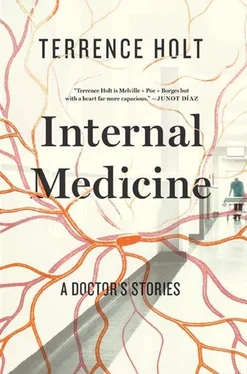But for now, Mr. Jenkins had time, a quiet weekend in a room with a view of Fall descending over the Piedmont.
Having been on call on a Thursday, I was facing my Golden Weekend — the once-a-month privilege accorded interns: two consecutive days off. I spent them with my family. Sixty hours together. On my return early Monday morning to the upper floors of the hospital I had a sensation of having been out of the action a very long time. Many of the patients I had been taking care of on Friday were gone, having been discharged by my resident over the weekend. Mr. Jenkins, naturally, was not one of those. I found him in his room, sleeping, a towel wrapped carefully around his head.
One of the things I passionately hate about my job is that it requires me to disturb people’s sleep, sick people who have managed, against the odds, to achieve some measure of oblivion. As I’ve grown older in the profession, I have become less conscientious — I often let patients sleep — but in those days I was conscientious to a fault. I roused each patient so that he or she could bear witness to the events since I had seen them last.
It was no different with Mr. Jenkins. I called his name from the doorway, softly, then as I moved to the bedside called again, using the same tone I use when waking my children. I pressed briefly on his shoulder and called his name again. This time he stirred and peeled himself a peephole in the towel.
“Whazzat?”
“Hi, Mr. Jenkins,” I said softly. “It’s Dr. Harper.” I paused to let that sink in. “How was your weekend?”
The eye goggled around the room in the same odd stock-taking I’d seen the first morning, before returning to settle on me.
“Okay,” he said softly. Then the eye inspected again. It seemed to be looking for something.
“Did you get any visitors?”
“No.” The eye was still, some small creature sulking in its hole.
“I’m sorry,” I said, and I meant it, too, thinking about him spending the weekend with nothing to think about but his dismal prognosis. If there’s any time you want family around, it’s when you’re looking at something like that.
I said as much to Mr. Jenkins. I can’t remember the exact words I used. I don’t suppose they mattered, because I found that eye of his staring at me and growing rounder until the towel came off his face and he was lying there looking at me with horror everywhere in the bed around him.
“You say what ?”
Then it was my turn to stare back at him, and maybe there was a little horror in my face, too. All I know was that for a long time we stared at each other as if each found the other completely incomprehensible.
But it was up to me to break out of it first, and I did.
“Your. cancer,” I said.
He tried to say something but it strangled to a whisper.
“Do you mean you don’t remember?”
He shook his head.
“Well.” I stopped short, at a loss for words. “There are some things the brain just doesn’t want to hold on to,” I said finally.
He was simply staring at me. Clearly I wasn’t connecting.
“Would you like me to tell you again?”
After a long pause he nodded. I took a breath, and with a fugitive sense that this wasn’t getting easier with repetition, I told him the story again. He seemed to take it in. He asked the same terrible questions. I had the same terrible lack of answers. And we left it at that.
I walked out of the room feeling shaken. It was partly the sheer rigor of it, having to tell again the story I’d never wanted to tell the first time. Or, okay, had wanted to tell, but only once. Was I being punished by some obscure hospital devil, forced for my sin of pride to experience again and again just what we do when we give bad news? I had a brief vision of myself as some kind of Kübler-Rossian version of the Flying Dutchman , doomed to wander the hospital forever in an unending struggle with denial. But that wasn’t it, not really. Mr. Jenkins wasn’t playing by the rules. Say what you want about denial, there was something else going on.
I tried to convey this on rounds, when we arrived at Mr. Jenkins’s door. I made a hash of it, of course, trying to wedge in between the morning’s lab results and the scheduled pulmonary function tests some ghostly aperçu I couldn’t articulate even to myself.
The attention span of a team on rounds is short at the best of times. I could tell I’d lost the interest of the resident. The other intern, scheduled for clinic in the afternoon and desperate to be done rounding, looked at me with something that fell just short of hatred. The med students stood apart in some shared goofiness. Only the attending was still looking at me, his expression a tolerant mixture of amusement and minimal curiosity.
“What do you think it is?” he asked me.
“I don’t know,” I confessed, feeling miserable that I was making an ass of myself. But Mr. Jenkins wasn’t playing by the rules.
What were the rules? I found myself wondering later. I had reached one of those random dead spells in the admitting day. I was at the workstation, going over sign-out sheets left by the three other interns whose patients I was covering overnight. Cx if spike; lasix 80 for SOB; Call VIR if HCT  : I had several pages of helpful hints from my peers on how to manage their patients’ likely misadventures. But there was no similar advice for how to deal with Mr. Jenkins. Give him the bad news until he finally believes it, because he has to. Make him do it until he gets it right. Isn’t that right? Wasn’t I doing it right?
: I had several pages of helpful hints from my peers on how to manage their patients’ likely misadventures. But there was no similar advice for how to deal with Mr. Jenkins. Give him the bad news until he finally believes it, because he has to. Make him do it until he gets it right. Isn’t that right? Wasn’t I doing it right?
Naturally, the next morning I saved Mr. Jenkins’s room for last on my early rounds, and knocked on the door with dread. I heard him hawk up something wet, spit, and then say, “Come in.” At the sound of his voice — a little guarded but otherwise sprightly — my heart sank.
He was sitting up, looking around him as if puzzled by his surroundings.
I stood in the doorway, a profound reluctance holding me.
“Hi,” he said. I was suddenly aware that Mr. Jenkins was shy.
“Hi,” I said back. I am usually shy too. This morning more so.
We held our positions for a long minute.
“Do I know you?” he asked.
The question hit me hard. The room took a sudden surge toward me, settling in a series of uneasy swells as I tried to absorb what he’d said. Not that I expect all my patients to know my name, or even recognize me for the most part — all those white coats. In most cases the acquaintance is all too brief, too casual. But Mr. Jenkins and I had accumulated some history.
I eased into the room, moving carefully as one might around a nervous beast, keeping my eyes on his as they followed my progress toward the bed.
“Don’t you?” I said as I crouched beside him.
He stared at me with a slowly dawning recognition that as I watched grew into horror.
“You know me, don’t you?” I said quietly. What was this? Some kind of conversion disorder? A hysterical amnesia? “You’ve seen me before, haven’t you?”
Jenkins’s head wobbled uncertainly between yes and no.
“I’m Dr. Harper,” I said quietly. “And you’re here because—”
Jenkins suddenly whipped his bedsheet over his head, clutching it there like a Halloween ghost. The ghost shook its head emphatically and let out a low moan.
“Oh, God. It happened. It happened, didn’t it.”
“What happened?” I asked.
He threw off the sheet, and his gaze scattered around the room, taking in the surroundings one more time. “I knew it,” he sobbed. “I knew it.”
This was progress, I thought, triumphantly — and felt immediately guilty as I realized how stricken he looked, staring around at the walls as though he expected them to fall on him.
Читать дальше

 : I had several pages of helpful hints from my peers on how to manage their patients’ likely misadventures. But there was no similar advice for how to deal with Mr. Jenkins. Give him the bad news until he finally believes it, because he has to. Make him do it until he gets it right. Isn’t that right? Wasn’t I doing it right?
: I had several pages of helpful hints from my peers on how to manage their patients’ likely misadventures. But there was no similar advice for how to deal with Mr. Jenkins. Give him the bad news until he finally believes it, because he has to. Make him do it until he gets it right. Isn’t that right? Wasn’t I doing it right?










